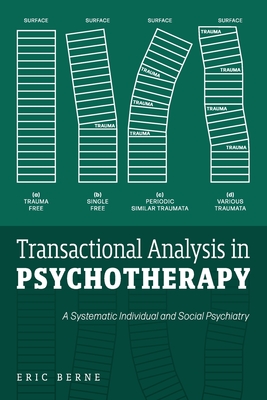Transactional Analysis in Psychotherapy: A Systematic Individual and Social Psychiatry

Transactional Analysis in Psychotherapy: A Systematic Individual and Social Psychiatry
Reprint of original 1961 edition.
Transactional Analysis in Psychotherapy by Eric Berne, M.D. introduced psychiatrists and analysts to a new way of understanding the motivations and social interactions of their clients and patients. By using this model, Berne believed that therapists could help their patients to better understand themselves and improve their relationships and their lives.
Canadian-born psychiatrist Eric Berne (b. May 10, 1910 - d. July 15, 1970) spent his early career working with patients in sanitariums before serving as a psychiatrist in the U.S. Army during World War II. After the war, he set up a private practice, in addition to conducting his own research and serving as a psychiatrist at the Veterans Administration and Mental Hygiene Clinic in San Francisco.
After being denied admittance to the San Francisco Psychoanalytic Institute in 1956, Berne was spurred to make his own mark on the field. He wrote several papers that year as he developed his theories, and he was invited to present his article "Transactional Analysis: A New and Effective Group Therapy" to the Western Regional Meeting of the American Group Psychotherapy Association of Los Angeles in 1957.
The next step was to put these ideas down into a book - 1961's Transactional Analysis in Psychotherapy. Berne's theory, while built on a foundation of Freudian principles, was clearly different. Where Freudian psychoanalysts focused on the balance between the emotional id, rational ego, and moral superego that make up one's personality, Berne instead assigned interpersonal relationships to the three ego-states of his clients - the Parent, Adult, and Child inside each.
The way we interact with each other, Berne proposed, influences which of our three ego-states is prominent at any given time. Transactional Analysis in Psychotherapy begins by identifying these ego-states and explaining how to diagnose them. It then explores the way social intercourse (called transactions) can stimulate the different ego-states.
Common social interactions are described in the language of games - different predictable patterns of communication that may appear normal on the surface, but conceal tension and self-serving - or self-destructive - motives beneath. Often counterproductive, these games indulge one of our ego-states and can damage our mental well-being and relationships.
An example of a game is called, "Why Don't You...Yes, But." In this game, one person makes suggesti
PRP: 76.30 Lei
Acesta este Prețul Recomandat de Producător. Prețul de vânzare al produsului este afișat mai jos.
61.04Lei
61.04Lei
76.30 LeiLivrare in 2-4 saptamani
Descrierea produsului
Reprint of original 1961 edition.
Transactional Analysis in Psychotherapy by Eric Berne, M.D. introduced psychiatrists and analysts to a new way of understanding the motivations and social interactions of their clients and patients. By using this model, Berne believed that therapists could help their patients to better understand themselves and improve their relationships and their lives.
Canadian-born psychiatrist Eric Berne (b. May 10, 1910 - d. July 15, 1970) spent his early career working with patients in sanitariums before serving as a psychiatrist in the U.S. Army during World War II. After the war, he set up a private practice, in addition to conducting his own research and serving as a psychiatrist at the Veterans Administration and Mental Hygiene Clinic in San Francisco.
After being denied admittance to the San Francisco Psychoanalytic Institute in 1956, Berne was spurred to make his own mark on the field. He wrote several papers that year as he developed his theories, and he was invited to present his article "Transactional Analysis: A New and Effective Group Therapy" to the Western Regional Meeting of the American Group Psychotherapy Association of Los Angeles in 1957.
The next step was to put these ideas down into a book - 1961's Transactional Analysis in Psychotherapy. Berne's theory, while built on a foundation of Freudian principles, was clearly different. Where Freudian psychoanalysts focused on the balance between the emotional id, rational ego, and moral superego that make up one's personality, Berne instead assigned interpersonal relationships to the three ego-states of his clients - the Parent, Adult, and Child inside each.
The way we interact with each other, Berne proposed, influences which of our three ego-states is prominent at any given time. Transactional Analysis in Psychotherapy begins by identifying these ego-states and explaining how to diagnose them. It then explores the way social intercourse (called transactions) can stimulate the different ego-states.
Common social interactions are described in the language of games - different predictable patterns of communication that may appear normal on the surface, but conceal tension and self-serving - or self-destructive - motives beneath. Often counterproductive, these games indulge one of our ego-states and can damage our mental well-being and relationships.
An example of a game is called, "Why Don't You...Yes, But." In this game, one person makes suggesti
Detaliile produsului










